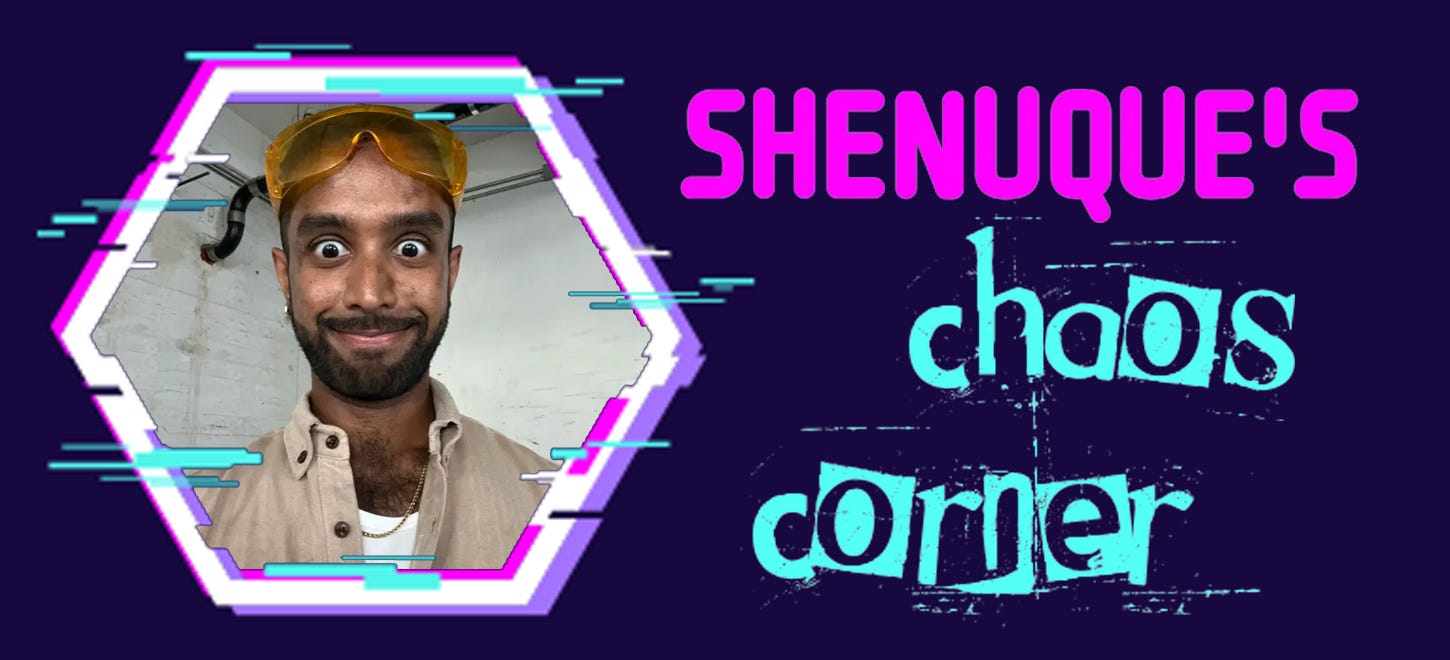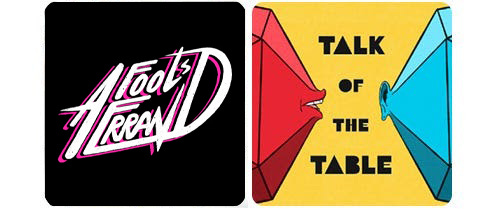The Many Sided Media team was recently playing a GM-less game that, towards the end, got pretty out of hand. We dove headfirst into Silly Land and, because there was no GM to rein us in, it took some time before someone actually pulled us back to our senses and got the game back on track. Yes, I was crying laughing and Elliot was fully unable to function because of the insane bits everyone was doing, but in terms of creating a satisfying or even just coherent story we were fully lost. I love moments like these, but they can’t make up the entire game and it can sometimes be hard to tell when it’s time to pull back and when it’s ok to go feel steam ahead with the kooks. Here are four tips I’ve picked up while playing, producing, and watching TTRPGs and APs that perfectly straddle the border between fun and insanity.
Perhaps our silliest episode to date
Candy Tastes Better After Eating Broccoli
Brian likes to say we are a “broccoli first” group, which is to say whenever Shenuque, Elliot, and I ask for something wild, weird or technically outside the rules of whatever game we’re playing, we tend to supplement it with some kind of negative. For instance, all throughout The Wildsea our crew asked Firefly Elliot for cool ship equipment or personal items with the caveat that all of them could be broken. We didn’t have enough stakes to afford all the things we wanted so we bargained instead—taking a handful of broccoli alongside that sweet, sweet candy.
The crew over at NADDpod deals with this situation often during Dungeon Court sessions. They’ll receive a letter from someone saying, “I let my players do this cool, funny thing once and now they want it all the time. Do I have to let them have it, or does that break the game?” Sometimes the answer is just to let them have it and the game will be fine. But more often than not the Supreme Crit Justices rule that as DM you should really dole out those treats sparingly, noting that your players will have so much more fun negotiating and attempting to earn that cool new toy than if it were just given to them. Candy you eat once a year, like Easter Peeps, is so much more satisfying and delicious than candy you have all the time, like regular ol’ marshmallows.*
No GM Actually Means Everyone’s the GM
The term “GM-less game” is very clear in its description, but in reality it’s the opposite of what those type of games truly are. Then again, the term “Oops, All GMs!” while funny, isn’t as clear right off the bat. But that’s what they are—games that split the responsibilities of a single GM amongst the table, so that everyone can guide the story and make world-altering calls. Using the X card is always something available to everyone at the table, regardless of game, but I find that in games with a Game Master role players tend to default to the GM’s ruling. When there’s no explicit GM role, players should feel comfortable stepping into and out of that position when needed. So when your table is becoming fully unhinged, don’t be afraid to step in and say, “Maybe we backtrack a bit, perhaps to before the Muppet drama teacher was thrown into the trunk of the getaway car?” I promise you’re not being a buzzkill.
Which TTRPG made you and your table laugh the hardest?
Let the Sillys Run Their Course
There is a natural ebb and flow to comedy. If your crew is doing bits left and right there will come a time when there is a dip in energy, after everyone has used their best ideas, and that is the time you’ll find it much easier to get back on track than if you try to interrupt the fun at its peak. Let everyone do their bit, get their joke in, propose the most insane scenario they can think of before you attempt to re-right the train.
Sometimes You Just Gotta Say No
Minor spoiler for Dimension 20’s Never Stop Blowing Up season, but there comes a point in episode 6 when Izzy starts to describe the consequences of an action she took before Brennan straight up says, “No, don’t. That’s my job. Stop that... Let’s just keep it normal.” The table is absolutely losing it at both the craziness of Izzy’s scene and at Brennan’s attempt to rein it back in. “You don’t talk. It’s great, I love you. Now we’re moving forward.” Everyone is clearly having so much fun, but, as GM, Brennan knows they are leaning far over the line into untethered silliness and that the right move is to pull everyone back over the border. As he puts it, “I promise, this has enough mustard.” Sometimes as a player, and especially when you’re the GM, you have to know when you’ve got enough mustard and be unafraid to call it out. Use that X card, draw a line. It’s entirely fine to say, “we’ve gone too far,” allow everyone to collect themselves, and then get back on track.
— Abby
*It should be said that I’ve been told I have terrible taste in candy. Case in point, I like Circus Peanuts and Necco wafers, and firmly believe that Peeps are best eaten stale.
How Actual Play Can Influence Other Art Forms
Actual Play borrows from many different art forms and performance styles. And while we often discuss the ways in which players and GMs can use outside materials like film, TV, and theater to influence their APs, those same APs also influence other forms in return. Artists of all types can benefit from playing TTRPGs and producing Actual Plays; as a comedian, AP has notably influenced my work.
As you may or may not know, before My First Dungeon and Many Sided Media, I was—and still am—a stand-up comedian. I’m currently working on my special, Where Do I Belong: An Immigrant Child’s Story. The special explores my journey as a person with many identities trying to navigate the world and figure out why I feel like I don’t belong anywhere. In writing this special, I’ve realized just how much my learnings from Actual Play have influenced this work.
It’s becoming increasingly important for stand-ups to use TikTok and Instagram Reels. It’s a blessing and a curse. Gatekeepers can no longer dismiss comedians when their following says otherwise, but the pressure to constantly create new content can be crippling. Unfortunately, this has led many comedians to write specifically for short-form clips. While this has resulted in some great content, when you aggregate those jokes for a special, it doesn’t always work.
If I’m being frank (and Frank is a shitty guy), it’s boring to listen to a long stand-up set that isn’t narratively connected. If you think about it, this makes sense. How often are you excited to listen to someone talk at you for 60 minutes, without any interaction, and with nothing they say connected to each other? That’s just a bad date.
Actual Play has helped pull me out of this new-age trap. The beauty of TTRPGs is that narrative is built into the game. In stand-up, it’s easy to lose the thread because comedians are conditioned to chase the laugh. But all comedians should know that sticking to a narrative and getting a laugh aren’t mutually exclusive. Actual Play is a prime example of how comedians can achieve both. Even in a longer set, your job is to entertain the audience. While making them laugh is part of it, another important part is keeping the set narratively engaging. For example, talking about how you got bullied in the third grade and then transitioning to a crazy trip to Norway can feel jarring unless there’s a narrative thread that ties the two subjects together.
This might seem obvious, but it’s not always clear to stand-ups. The reasons why AP helps tell a narrative are simple, too. Actual Plays force artists to answer these straightforward questions:
What is our goal in telling this story?
What are the rules that exist in this world to tell this story?
What can we cut out because it doesn’t serve our goal?
These questions have helped me write this new show in a way that I believe is a compelling narrative, and they’ve even pushed me to reconsider what audiences should experience during a stand-up special.
Here’s how I applied these prompts to my set:
What is my goal in telling this story?
To make the audience question why many of us have felt like we don’t belong, using my life’s anecdotes to expose the societal factors that create those feelings.
What are the rules that exist in this world to tell this story?
Fundamental rule: Not everyone belongs.
Sub-rules:
Some names are considered normal, while others aren’t.
Some people look different.
Not all cultures are the same.
What can we cut out because it doesn’t serve our goal?
Of all the material I write, which jokes serve the story, and which can I cut because they’re just funny?
Actual Play is like the creative engine that keeps on giving. I highly recommend seeing where it can help you with any other art forms—writing2, acting, directing—you love to pursue.
— Shenuque
🗞️ News Worthy
New Jersey Web Fest released its list of award nominations, including FOUR nominations for My First Dungeon!
Brandon Sanderson’s Cosmere TTRPG raised over $7 Million in its first week on Kickstarter.
🎲 What We’re Bringing to The Table
🎥 Watch: Beyond the Brook the miniseries inspired by the animated series ‘Over the Garden Wall’ by Patrick McHale and co.
📚 Read: A Couple of Drakes Design Studio updated its guide on How to Layout Books and Zines
🎧 Listen: The first episode of Dungeon Masters from QCode is out now
🎙️ New From The Studio
[Feed Drop] A Fool's Errand “The Network Defenders” E01 - Memories
[Feed Drop] “Lilting Towards Terror” Harnessing Humor & Horror in TTRPGs with Cameron Strittmatter









